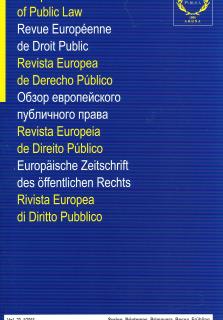
Global Administrative Order
Bulgaria
Although there are many doctrinal debates and disputes with regard to the definition of the notion “global administrative order”, the Bulgarian academic researchers continue working in order to reveal its contents and develop the knowledge related to it. The national policy of economic openness turns the country to a substantial partner in the globalisation process. Bulgaria is a party to almost all important international bodies (UN, WHO, ILO, WTO, IMF, UNFCCC, ISO, IEC, CAD etc.) and its weight within their framework is constantly growing. But this worldwide cooperation, unification and interdependence prove not to have always positive impact on the national state. Since the country is an EU Member State, most of the international requirements and commitments pass through this European organisation’s institutional policy and regulations in order to be transposed into the internal legislation. Besides this less or more formal way to adapt its administration management to the global trends and attainments, there is another path for the improvement of public, business and civil society institutional performance. The attractiveness and the appropriateness of the “good practices” in the field are properly assessed before implemented. That is a merit of the scholars practising in the area and having fruitful relations with their colleagues from different countries.





















